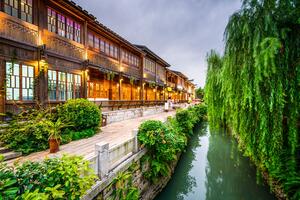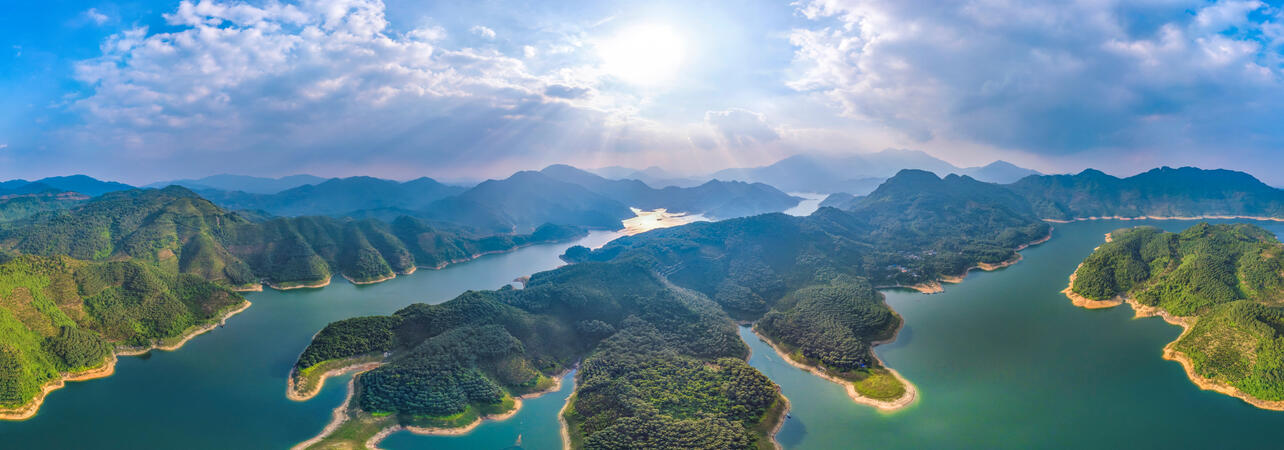 Ecological Civilization (Shengtai Wenming) is a term that emerged 30 years ago in China and is now being discussed in the West. What do the terms “Ecological” and “Civilization” mean in Chinese? In Chinese “ecological” means 生态 and “civilization” means 文明.
Ecological Civilization (Shengtai Wenming) is a term that emerged 30 years ago in China and is now being discussed in the West. What do the terms “Ecological” and “Civilization” mean in Chinese? In Chinese “ecological” means 生态 and “civilization” means 文明.
Prior to the modern period, “ecological” denotes a state of life or liveliness with an aesthetic dimension, while its modern referring largely refers to the scientific study of ecology. In contemporary China, “ecological” is used to describe something that is natural and unpolluted. Nonetheless, the concept is an ever evolving one. It is continually reinvented by the younger generation as a term that speaks to the place of human in the earth’s life system.
While the modern English term “civilization” has often been associated with Western imperialism and is considered by some as irredeemable, Chinese classical understanding of civilization is closely associated with life, virtue, and beauty. Appearing first in the Chinese classic Zhouyi, “civilization” was used to evoke a vision where “the dragon appears in the field.” A Chinese philosopher of the Sui and Tang Dynasty, Kong Yingda commented on the verse by referring to “the flourishing of the field and the birth of all things.” Thus, the Chinese classical understanding of civilization is very much “ecological.”
A key goal of Ecological Civilization in China is: Moving from an industrial society with unlimited economic growth that is destroying land, air, and water to an ecological civilization that provides a basis for the well-being and health of both people and the planet. Many individuals and groups in China are trying to find the next stage beyond rapid industrialization and unsustainable development, which has brought massive economic growth, but has also caused widespread biodiversity loss, climate upheavals, and intense pollution with public health consequences. Similar efforts are being made in Western countries under the rubric of sustainability.
This implies a paradigm shift toward an ecocentric worldview, rather than an anthropocentric worldview. This involves drawing on philosophical and religious traditions for shaping a broader environmental ethics and transformative action. This was the assumption of the 10 Harvard conferences and books on World Religions and Ecology (1996-2007). The Chinese are reviving their own traditions of Confucianism, Daoism, and Buddhism for ecological ethics. Ecological Civilization is having traction on many levels of Chinese society, especially in education. Its implications and its efficacy can be explored more fully in environmental policy, law, and NGO work. Building and implementing ecological civilization in a systemic and practical manner has been discussed for several decades and is in the Chinese Constitution since 2018. For an overview, see “Ecological Civilization: An emerging paradigm in China.”
This website, then, is a platform for gathering materials on Ecological Civilization (EcoCiv) in China and the West. Like many comprehensive ideas, this is filled with complexity and ambiguity. However, it is our assumption that this aspiration is a vital component of responding to social and ecological challenges. For in addition to environmental science, policy, law, economics, and technology a robust shift of values and culture is needed for systemic long-term changes. We acknowledge the work of many people in this area in China and in the West. This includes Pan Yue who published an article in 2006 titled “On Socialist Ecological Civilization,” which helped to establish the foundations for this idea. Pan was Vice-Minister of State Environmental Protection Administration from 2003-2016. Since 2022 he is director of National Ethnic Affairs Commission (NEAC).
Trips to China for Ecological Civilization
In the summer and autumn of 2024 and in April of 2025, our directors Mary Evelyn Tucker and John Grim traveled to China, where they gave many talks and interviews (including this one for China Global Television Network) and participated in numerous conferences to build further bridges and share the ideas and aspirations of Ecological Civilization, including one in Urumqi, chaired by Pan Yue, himself. Read a summary of the 2024 summer trip here. Read Mary Evelyn and John’s reports on their April 2025 trip here.
Conferences and Events in the West
In the West over the last 17 years there have been conferences on Ecological Civilization at the Claremont Colleges in California. Mary Evelyn and John have participated in a number of these conferences and welcomed Chinese scholars to Yale as well. These conferences were convened by the Whitehead-inspired Center for Process Studies (CPS) and the Institute for Postmodern Development of China (IPDC) under the leadership of John Cobb, David Ray Griffin, Zhihe Wang, Meijun Fan, and Philip Clayton. Zhihe Wang has helped to establish some 36 Centers for Process Studies and Constructive Postmodern Philosophy at Chinese Universities. In 2015, Wang Zhihe, Meijun Fan, and John Cobb organized a large conference at Claremont attended by over 1000 people. After this, Philip Clayton and Andrew Schwartz co-founded the Institute for Ecological Civilization (Eco-Civ). Many people in the West are finding ecological civilization to be an important framework for the systemic transformations needed for a flourishing future.
|
Reports & Statements
|
Books In this section are full-length volumes on or related to the concept and practice of Ecological Civilization, which date from 2014 to the present. There is also a separate section for the “Toward Ecological Civilization” series from Process Century Press. |
| Articles Here you'll find both academic and news articles published in English, concerning Ecological Civilization, which date from 2011 to the present. |
Multimedia
A sampling of videos related to Ecological Civilization can be found here, as well as featured playlists aligned with this topic. |
| Journals
Here you will find information on the journals in the field (published in English) that are talking about themes related to Ecological Civilization, whether ongoing or just a special issue. |
Links
This listing provides links to a variety of organizations and websites related to Ecological Civilization for further exploration |
Featured Videos What ancient wisdom can teach us about climate action?
Mary Evelyn Tucker and John Grim CGTN: Climate Watch April 29, 2025
The Ecological Wisdom in Confucianism East and West Dialogue on Ecological Civilization
|
Header photo: Wanquan River Upstream and Reservoir Facilities, National Ecological Civilization Pilot Zone in Hainan Province, China; Shutterstock/DreamArchitect


